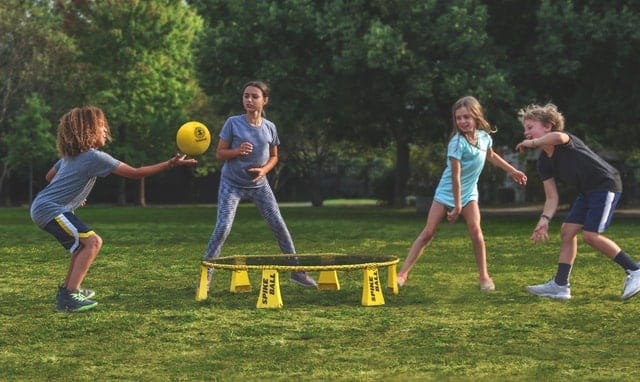Self-Esteem for Kids
Merriam-Webster defines self-esteem as a feeling of having respect for yourself and your abilities, or a confidence and satisfaction in oneself. Self-esteem helps children face challenges, try new things, learn well, and develop well in general (Raising Children).
A child with healthy self-esteem is more likely to be successful academically, socially, emotionally, and even physically. Conversely, low self-esteem can contribute to mental illness such as anxiety and depression, and is often a cause of poor physical health. Low self-esteem negatively affects all types of relationships: friendships, work relationships, romantic relationships, to name a few. It also impacts work and job performance, and creates a predisposition toward abusing alcohol and drugs (CMHC).
Read on to learn what self-esteem is, why it is important, and some of its characteristics. Then we’ll share actionable ways that caregivers and teachers can promote healthy self-esteem for kids.
What Self-Esteem Means for Kids
Self-esteem has been called “the mainspring that slates every child for success or failure as a human being” (CHHS). That said, nurturing self-esteem in a child is one of a caregiver’s most important responsibilities.
Children need to feel proud of themselves for what they can do, see the good in themselves, and accurately assess their own strengths and weaknesses. This will help them believe in themselves and be resilient when facing adversity (Kids Health).
Why Self-Esteem Is Important
Mental Health

Research by the American Psychological Association has shown that having good self-esteem is essential for positive mental health and well-being. It also helps children develop empathy and perspective, as well as coping skills and perseverance (Very Well Mind). And, as stated above, having poor self-esteem contributes to a variety of mental health issues (Positive Psychology).
Academic and Life Success
Self-esteem often means that kids hold high standards for themselves. This manifests itself in several different ways. First, these high standards can help kids set goals—in school, and beyond. As a result, they improve their ability to cope with the setbacks and difficulties in reaching their goals. They learn to persistently try until they achieve success, ultimately have more opportunities and broader life experience.
Relationships
Good self-esteem is an essential component of high-quality relationships. When a child sees their own value, it allows them to better see the value in others. This leads to better interactions, which in turn leads to better self-esteem. The result is a cycle of growth that can last a lifetime.
Physical Health
Children who like themselves treat their bodies well. They typically take care of their physical health and are healthier in general. They are more likely to exercise regularly and subsequently recover faster from illnesses (Positive Psychology).
Characteristics of Self-Esteem

Kids with self-esteem often exhibit the following characteristics:
- Trying new things, including those that they might not be good at
- Facing challenges instead of avoiding them
- Persevering in spite of difficulties
- Coping with stress, anxiety, and pressure, whether at home or school (Very Well Mind)
- Believing in themselves (Raising Children)
- Accepting themselves for who they are
Ways to Build Self-Esteem for Kids
It is possible to build self-esteem at any age. While earlier is better, supportive parenting can change the trajectory of a child’s life no matter where they are in their development.
Warm and loving parental relationships are the basis of self-esteem. They make children feel worthy and valued. Here are some specific suggestions for strengthening your relationship with your child and building their self-esteem.
1. Set boundaries and limits.
Set boundaries and limits to help your child feel secure and grow emotionally (Sanford Health).
2. Show interest in what your child values.
If they love music, listen to or play music with them. If they love books, take them to the library. Engaging with your kids shows them they are worth your time and attention (Raising Kids).
3. Have them do chores or help around the house.
This can include helping prepare meals, making their beds, feeding pets, or washing dishes. Contributing to the household makes kids feel accomplished and shows that you trust them to help (Kids Health).
4. Treat each child as a unique individual.
Remember, one size never fits all…so parent each child in a way that works for both of you.
5. Give balanced feedback.
This means praising your child for trying their best or doing something new, not for being the best. This teaches children to value their own efforts, and to be a good teammate (Raising Children).
6. Listen to and acknowledge your child’s thoughts and feelings.
Teach them how to deal with uncomfortable feelings and, ultimately, to self-regulate.
7. Give your child choices.
Give options and allow your child a feeling of reasonable control over their life (CHHS).

8. Make family meals together.
This strengthens family ties and allows everyone to contribute to the meal. Children can set the table, chop vegetables or cut fruit, or wash lettuce for salad. Meals also give everyone a chance to connect as a family (Raising Children).
9. Show love and affection to your children regularly.
Exhibit love and affection including physical affection—hugs, kisses, etc. Do not withhold affection even if they are misbehaving. To be effective, your love must not be conditional. Continue reinforcing that your child is lovable (CHHS).
10. Encourage them to keep trying even when things are hard.
Praise the effort. Reward perseverance. This builds their resilience.
11. Coach children through difficult social situations.
Children can experience difficult social situations at school or elsewhere. Role-play them, talk through them, etc. This helps prepare children for these situations and build confidence (Raising Children).
12. Keep children connected.
Keep children connected to family friends and extended family as much as possible. This helps develop their sense of belonging and identity. Other options include being part of a religious community, sports club, or another group (Raising Children).
13. Allow them to make mistakes.
Do not expect children to be perfect. Instead, let their mistakes be learning opportunities (Sanford Health).
14. Keep realistic expectations of your child.
This helps them meet the expectations or exceed them. Their self-esteem will grow as a result.
15. Focus on the positives.
Notice what your child is doing right, and praise them for those actions. This reinforces positive behaviors and discourages poor choices (Sanford Health).
Conclusion
Self-esteem can be nurtured in children during their childhood development. It is essential in helping them feel worthwhile, secure, and develop self-worth. This affects every area of their life.
Soul Shoppe provides social emotional learning programs for parents, schools and businesses. Soul Shoppe helps children with empathy, emotional literacy, conflict resolution and more.
You May Also Like:
Teaching Empathy To Kids and Teenagers
Virtual Social Skills Activities
Self-Care Activities for Students
Sources:
CHHS, CMHC, Kids Health, Positive Psychology, Raising Children, Sanford Health, Very Well Mind


